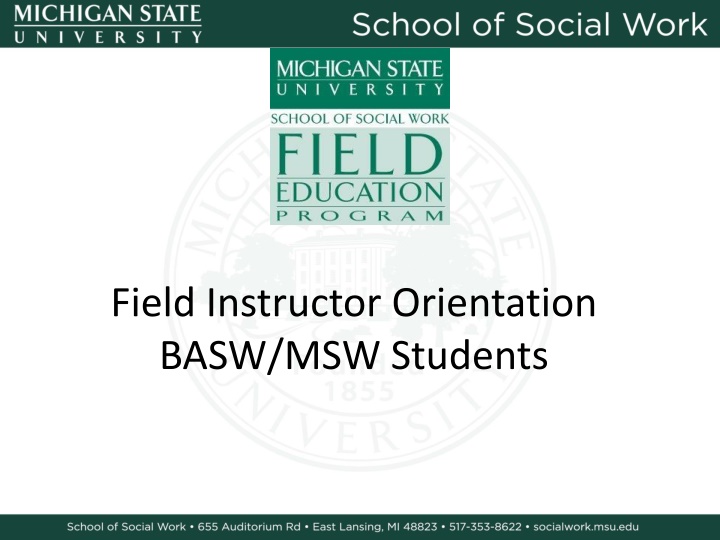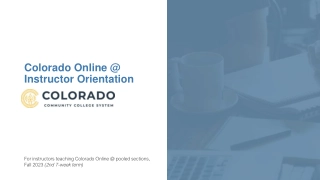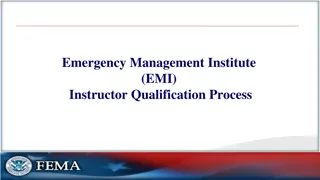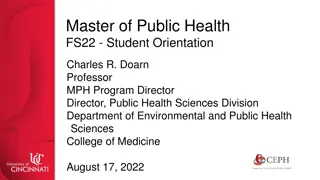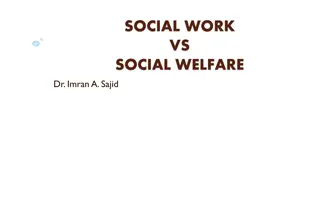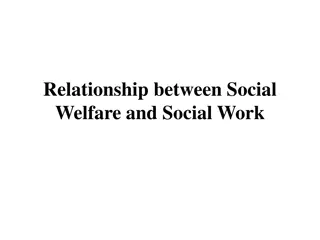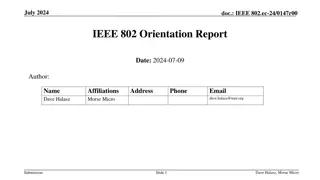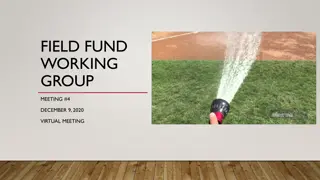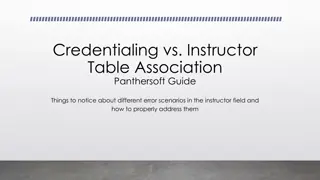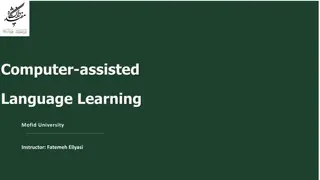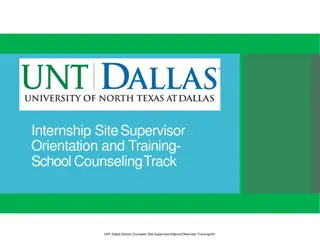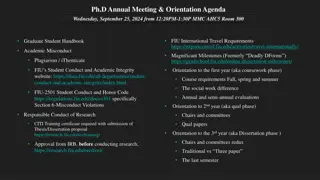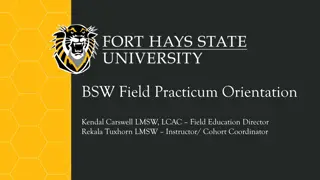Field Instructor Orientation and Responsibilities in Social Work Education
This content covers the field instructor orientation and responsibilities for Bachelor and Master of Social Work students, including training objectives, the purpose of field education, roles and responsibilities, field instructor qualifications, and specific responsibilities to the student and school. It emphasizes the importance of developing professional identity, self-understanding, theory-practice integration, and competent practice skills in social work education.
Download Presentation

Please find below an Image/Link to download the presentation.
The content on the website is provided AS IS for your information and personal use only. It may not be sold, licensed, or shared on other websites without obtaining consent from the author.If you encounter any issues during the download, it is possible that the publisher has removed the file from their server.
You are allowed to download the files provided on this website for personal or commercial use, subject to the condition that they are used lawfully. All files are the property of their respective owners.
The content on the website is provided AS IS for your information and personal use only. It may not be sold, licensed, or shared on other websites without obtaining consent from the author.
E N D
Presentation Transcript
Field Instructor Orientation BASW/MSW Students
Training Objectives Understand roles & responsibilities for stakeholders in field education Identify 3-5 ways to orient student to organization Identify developmental stages of internship experience Identify at least 2 ways to help students integrate theory into practice Develop skills to respond to challenging student situations Know the paperwork requirements (Learning and Evaluation Tool (LET), process recording)
Purpose of Field Education Students will develop: Professional identity Self-understanding Integration of theory and practice Skills toward competent practice Field Education is 28% of graduate and 10% of undergraduate degree requirements BASW/MSW first placements are generalist practice, with both micro and macro experiences Second MSW placement or advanced standing are concentration focused
Field Instructor Qualifications For BASW students: A baccalaureate degree in social work or BA degree with extensive social service practice experience For MSW students: An MSW degree with two years of post-master s experience, license preferred
Field Instructor (FI) Responsibilities To the Student Provide orientation to the agency and agency paperwork Assist in developing the Learning Agreement Coordinate educational opportunities Provide weekly, 1hr supervision Provide ongoing feedback Assist student with challenging situations (with clients & organization) To the School Participate in field trainings Complete mid-semester verbal evaluation Consult with liaison re: issues/concerns Report any changes that affect field placement: If FI leaves agency/changes supervisor to student If learning activities drastically change If there are concerns about student performance Complete, sign, and return all field related forms/documents
Benefits of Field Instruction $5 CEUs for appointment year 7/1-6/30 Appointment as Clinical Faculty with MSU Library privileges Use of intramural facilities and Forest Akers Golf Courses Purchase of athletic tickets at faculty rate MSU identification card Eligibility for faculty membership in University Club Parking privileges (must purchase permit) MSU Net ID/Email
Student & School Responsibilities Student Responsibilities to FI/Agency Participate in development of learning activities Prepare for supervision & take active role in learning Follow rules/policies Maintain professional behavior Adhere to NASW Code of Ethics Report safety issues to FI Address concerns appropriately School Responsibilities to FI/Agency Assign field liaisons Provide consultation, mediation, problem solving Monitor internship progress Review Learning Agreements and Evaluations/LET forms Address any concerns that arise Facilitate field seminar Conduct agency site visit Assign final grades
Getting Students Started History Mission Goals Services Provided Populations Served Role of Social Workers Organizational Structure Policies & Procedures Have student review agency website and provide summary/list of questions for FI Assist student with setting up interviews with other staff members & prepare questions Highlight key areas, meet with HR, group training
Safety Students have the right to remain safe at all times Students have been instructed to communicate any concerns to the field instructor and/or field liaison Tips to keeping students safe: Know the agency policies!!! Use supervision to discuss concerns Hone social work gut
Stages of Student Field Placements & Field Instructor Role CONTENT FROM THE SUCCESSFUL INTERNSHIP: TRANSFORMATION AND EMPOWERMENT IN EXPERIENTIAL LEARNING; H.F. SWEITZER & M.A. KING: SECOND EDITION, BROOKS/COLE, BELMONT, CA. (2003)
5 Developmental Stages of an Internship Stages Description Field Instructor Role 1. Anticipation Common Feelings and Questions student may ask themselves: Review and discuss orientation checklist Clarify student responsibilities with student and staff Give the student immediate constructive feedback if they say or do something inappropriate Share unwritten rules of the agency Provide positive feedback to develop self confidence Open dialogue around student fears Complete learning activities Anxiety Excitement The what if stage Can I really do this? How will I juggle my life with field placement?
5 Developmental Stages of an Internship Stages Description Field Instructor Role 2. Disillusionment May feel some disappointment in the field placement (the honeymoon is over) Consistently meet for supervision and address issues as they arise Recognize this is an important part of the field placement and not a reflection of the agency or supervisor/FI skills Listen and help student gain perspective on the situation. Be mindful that it is not a therapeutic relationship Challenge and encourage student to learn from experiences Discuss ethical implications Difference between student expectation and reality becomes more apparent Unexpected issues may arise Student may be challenged by relationships, or policies/procedures in the agency
5 Developmental Stages of an Internship Stages Description Field Instructor Role 3. Confrontation Offers opportunity for growth-personally and professionally: Understand the mismatch between perception and reality Clarify what the concerns are and how to address them Reassess goals, expectation and support systems Same suggestions for stage 2/disillusionment Support student as they address concern Role model appropriate behavior for confronting professional issues Address inappropriate or unprofessional behaviors ASAP (including informing field liaison)
5 Developmental Stages of an Internship Stages Description Field Instructor Role 4. Competence Confidence begins to grow: Acknowledge growth to increase confidence Begins seeing self as less of a student Begin to treat student as professional colleague Begins to take challenges independently Allow student room to apply decision making skills while providing guidance and support as needed Increased confidence and comfort making decisions
5 Developmental Stages of an Internship Stages Description Field Instructor Role 5. Culmination Occurs as the field placement is nearing the end: Make plans for termination of clients/systems with the student Termination/transition with clients begins Help student understand the implications of termination as the client and as a professional SW Begin to think about what is next May have fear, anxiety, or sadness over things not yet accomplished Offer to assist student with networking Review LET activities and evaluate progress together Sadness about leaving the agency Plan a goodbye activity with student/staff
Integrating Course Content in Field Shifting from acquisition of knowledge to application of knowledge
Integrating Course Content in Field Students often don t critically analyze their action. When one task is completed, they move on to the next task. They must be prompted to make the connections between the tasks, and the reasons behind the tasks. The process of making connections is the process of integrating theory and practice. It is the role of the field instructor to assist the student in making these connections. For every client interaction, students should be given opportunities to understand the social work skills that were necessary during the interaction, the social work knowledge that informed these actions, and the social work values that influenced the interactions. (CSWE, 2003)
Integrating Course Content in Field Examples of Knowledge, Values, and Skills Social Work Knowledge Diversity At Risk Populations/Social and Economic Justice Human Behavior/Social Environment Research Social Work Skills Attending Building Rapport Clarifying Paraphrasing Reflecting Feelings Summarizing Stating Where the Client Is Probing Focusing Verbal Following Empathic Communication Confrontation Establishing Goals Identifying Tasks Contracting Educating Reframing Reviewing and Evaluating Termination Social Work Values Service Social Justice Dignity and Worth of the Person Importance of Human Relationships Integrity Competence
Integrating Course Content in Field Questions to help students process their work: What was the purpose of the work? What were the knowledge, values skills used in the situation? How were these elements used and why were they necessary for effective practice? *Please also see supervision agenda template in Sonia
Process Recording Required 1x/semester of all students Gain insight into what occurred with a client or system Used to establish Learning needs Knowledge gaps Ability to address issues which may influence clinical or organizational decisions Ability to work with individuals, teams, groups, etc. Knowledge of social work values, ethics, and human variability https://socialwork.msu.edu/programs/Field- Education/Documents/Process-Recording-Guidelines.pdf
Learning & Evaluation Tool (LET) 1 tool completed in 2 parts Student responsibility to initiate beginning of semester FI responsibility to complete at end of semester Activities must be Specific Measurable Achievable Realistic Time-bound
Evaluation and Grading Semester evaluation based on learning agreement (signatures, date, grade, number of hours), attendance and participation in integrative field seminars, and input from field instructor and liaison Grading is pass/no grade Field instructor recommends a grade to liaison who reviews and submits recommended grade to coordinator
Competency 1: Demonstrate Ethical & Professional Behavior What does it look like in practice? Review NASW code of ethics and apply to case/scenario. Follow agency policies and procedures. Maintain confidentiality and informed consent. Engage in reflective discussions with FI. Maintain professional boundaries. Dress appropriately for activity/setting. Use professional language in all communication. Be prompt/punctual/organized for client and agency interactions. Practice appropriate, healthy, safe self care. Maintain appropriate/professional social media presence and boundaries. Prepare and participate in supervision regularly.
Competency 2: Engage in Diversity and Difference in Practice What does it look like in practice? Make appropriate community referrals. Accurately consider systemic issues in assessment phase. Utilize trauma informed approach with clients. Adapt interviews to audience (various identities). Engage in activities that further teach on diverse issues of community. Report out on knowledge gained. Participate in professional development. Treat all clients with respect and dignity. Use appropriate/professional language with clients. Recognize when/how personal biases/privileges impact services to client (systems).
Competency 3: Advance Human Rights and Social, Economic, and Environmental Justice What does it look like in practice? Articulate/present knowledge of the impact of systemic oppression and discrimination of clients. Educate client, agency, community on client rights. Inform and provide access to resources for clients. Promote self determination. Participate in agency staff meetings, board meetings, policy reviews, community meetings, etc. Prepare and present case consultations with colleagues/FI. Advocate on behalf of client with other organizations (case advocacy). Advocate for social cause important to agency, clients, community (cause advocacy). Participate in fund raising efforts.
Competency 4: Engage in Practice Informed Research and Research Informed Practice What does it look like in practice? Review client records/notes looking for trends/patterns. Gather multiple sources of information before making decision or recommendations. Articulate variables that impact services. Understand and apply evidence-based practices utilized within the agency. Engage in evaluation of client progress. Explore agency policy/practices and align with literature on evidence-based practices. Assist with grant securing process. Describe an agency program using logic model.
Competency 5: Engage in Policy Practice What does it look like in practice? Review and apply federal, state, local policies to agency practice. Make appropriate community referrals. Participate in review/revision process of agency policies/procedures. Provide agency outreach services. Engage in discussions/activities that improve service delivery. Participate on multi-disciplinary teams or community coalitions. Participate in agency accreditation activities. Analyze policy & draft policy brief.
Competency 6: Engage with Individuals, Families, Groups, Organizations, Communities What does it look like in practice? Articulate micro-mezzo-macro levels of influence on clients. Apply and discuss ecological systems theory on case(s). Complete home visits. Conduct client centered interviews. Articulate how socioeconomic factors influence client functioning. Utilize different techniques to engage clients. Review client file/data prior to meeting. Make follow up contacts with clients. Engage in intake processes. Participate in interagency/interdisciplinary meetings.
Competency 7: Assess Individuals, Families, Groups, Organizations, Communities What does it look like in practice? Correctly use agency tools/documentation. Complete biopsychosocial assessments. Correctly interpret data gathered from assessment tools. Use agency data base to complete forms correctly. Complete client interviews. Interview family/community members. Align data results with appropriate interventions. Review agency quality improvement practices.
Competency 8: Intervene with Individuals, Families, Groups, Organizations, Communities What does it look like in practice? Implement agency interventions and supports with clear timelines and measurable outcomes. Supervise implementation of treatment plan. Implement case management services. Make appropriate referrals. Co-facilitate skill building, psycho-ed, group sessions. Participate in agency meetings (case consults, staff meetings). Advocate for clients during meetings. Engage in progress review meetings. Modify goals and interventions appropriately. Network with other organizations.
Competency 9: Evaluate practice with Individuals, Families, Groups, Organizations, Communities What does it look like in practice? Report on agency data regarding clients served, services provided, and outcomes. Articulate uniqueness of each client in evaluative processes. Analyze client data to make appropriate recommendations. Appropriately engage in termination/transition processes with clients. Create agency action plan based on data collected. Participate in program evaluation project. Represent agency (with data) at community meeting.
Challenges in the Field Placement
Challenges in Field Education Professionalism Student dress and grooming Student dress and grooming should conform to agency expectations and should not interfere with ability to intervene with client/systems. Attendance Student should arrive on time, stay the duration of the workday, avoid excessive absences. Behavior and attitude Student should have a positive attitude about the agency, field instructor, co-workers, fellow interns, and clients. Misuse of personal cell phone and/or social media. Identify with social work as a profession Student should embody the 6 values of the social work profession and demonstrate commitment to values through performance and attitude. Use of time Student should make good use of time by managing it in a manner that is conducive to completing tasks and assignments on time and by established deadlines. Adherence to NASW Code of Ethics Student should understand standards outlined in the NASW Code of Ethics and demonstrate knowledge through conduct and performance.
Challenges in Field Education Personal Circumstances Past Personal Experiences Student should be aware of how past experiences may impact relationships at field placement site (clients, staff, community). Current Family Issues Student should be aware of how current family situations may impact performance at placement site (divorce, births, etc.). Other Commitments Student should ensure that other commitments outside of the field placement do not interfere with commitment to the clients/agency. Ability to Balance School and Work Student should make necessary arrangements to ensure ability to effectively handle school and work so neither is adversely impacted.
Challenges in Field Education Managing Relationships Field Instructor Relationship Teaching Style v Learning Style Student should work with FI to ensure FI s teaching style and student learning style are complimentary. Identify and discuss differences, concerns, issues. Client Relationships Establishing Rapport Student should work with FI to gain knowledge/skills necessary to build rapport. Maintaining Professional Relationships Student should work with FI to build knowledge/skills necessary to manage healthy professional relationships with clients. Utilizing Appropriate Techniques Students should work with FI to build knowledge/skills necessary to intervene with clients effectively. Managing Assignments Effectively Student should work with FI during each stage of practice to build knowledge/skills to effectively manage assignments from start to finish. Student should work with FI to ensure supervision meetings occur on a regular and consistent basis, prepare for meetings (case presentation, organizational concerns, client issues, etc.) Supervisory Meetings
Challenges in Field Education Performance Professional Etiquette Student should communicate in professional manner, demonstrate office etiquette and manage self in a professional manner in all agency representation. Time Management Student should manage time wisely to ensure work is done timely, meetings are attending promptly, deadlines are met while maintaining flexibility for unforeseen circumstances. Quality of Work Product Student should produce quality work reflective of guidelines set forth by agency demonstrating knowledge, values, skills of social work practice. Work Place Behavior Student should maintain behavior in alignment with social work value promote dignity and worth of the person while carrying out duties of the agency. Skill Level Student should demonstrate knowledge, values, skills of the social work profession through behavior, actions, and work produce.
How to Manage Student Issues Provide student with immediate feedback Be clear and concise Inform student of required behavior change Set a time frame Follow up re: time frame, provide additional feedback, adjust as necessary Document interventions using supervision tool Address areas of growth and learning opportunities in Learning Agreement and /LET Notify LIAISON/FIELD COORDINATOR immediately of any recurring issues, NASW violations, unprofessional behavior, harassment, discrimination or illegal behavior (HIPPA).
Paid Placement/Internship Stipend: Now or in the future create a budget line or seek grand funding for intern stipends. Between $500-2500 is average. Hourly Pay: Find ways to hire interns as part-time staff to compensate for the work they already to. Employment Based Placement: If the student works for the agency lets use the paid position as field credit. AmeriCorps: Partner with AmeriCorps for part time positions.
Remember to also check Field Education Website for more info on Sonia system. https://socialwork.msu.edu/Programs/Field-Education
